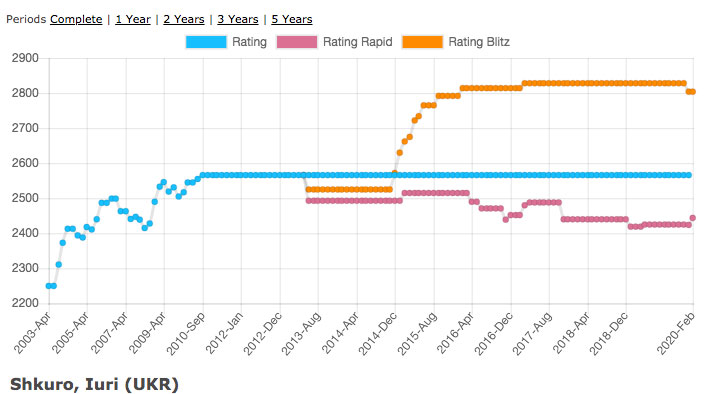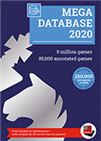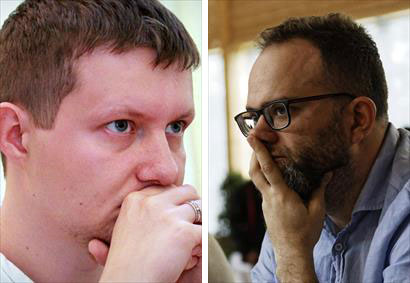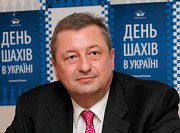The New Year in Ukraine
2020 began in a really uninspiring way for those who wish the Ukrainian chess community to remain a decent and respected part of the chess world.
In the official January FIDE ratings, FM Ihor Kobylianskyi entered the World Top-10 in Rapid. On the blitz rankings, Iuri Shkuro (whose Grandmaster title deserves, in my view, to become a subject of the separate investigation) returned, after the period of inactivity, to the Top-10 in by playing one local FIDE rated blitz tournament in November, showing there his more or less real level. But Shkuro's previously accumulated "passive" blitz rating was already high enough to stay in the Top-10 even after the loss of more than 20 Elo points.
Objectively, there are no signs that Kobylianskyi's or Shkuro's chess level is sufficiently high to be among Top-500 — and probably even Top-1000 — of the world's best players, in any form of chess. So, for the first time Ukraine has not one but two obvious rating manipulators in the World Top-10 lists.

The rating charts for Iuro Shkuro showing the sudden divergence of his blitz rating | Image: FIDE ratings
The 50-year-old Kobylianskyi and the 37-year-old Shkuro are living in the very different parts of Ukraine: Ivano-Frankivsk and Kherson, respectively. But they still have many things in common. First of all, they are not widely known, even in Ukrainian chess circles!
I'm still not sure whether I ever met either of them personally. (Though we may have played in the same tournaments in Ukraine sometime, and in the case of Kobylianskyi, who was born in 1969 — as well as Vasyl Ivanchuk, by the way — it could have happened, hypothetically, even in the early 1980s. So, who knows? The fact is that I don't remember him).
 The ChessBase Mega Database 2020 is the premiere chess database with over eight million games from 1560 to 2019 in high quality. Packing more than 85,000 annotated games, Mega 2020 contains the world‘s largest collection of high-class analysed games. Train like a pro! Prepare for your opponents with ChessBase and the Mega Database 2020. Let grandmasters explain how to best handle your favorite variations, improve your repertoire and much more.
The ChessBase Mega Database 2020 is the premiere chess database with over eight million games from 1560 to 2019 in high quality. Packing more than 85,000 annotated games, Mega 2020 contains the world‘s largest collection of high-class analysed games. Train like a pro! Prepare for your opponents with ChessBase and the Mega Database 2020. Let grandmasters explain how to best handle your favorite variations, improve your repertoire and much more.Both of them are professional chess coaches; one of Kobylianskyi's pupils is GM Vladimir Onischuk. Both of them, especially Kobylianskyi, have rarely competed in the any internationally significant tournaments — having, therefore, not many games in the ChessBase Mega Database. Both, as far as I can judge, never really played on the professional/grandmaster level, which is 2500 classical Elo and above. Both of them have produced their fantastic ratings, in rapid and blitz, respectively, in self-organized tournaments, playing mainly against the extremely low-rated opposition.
The FIDE Director General grandmaster Emil Sutovsky reacted immediately by writing on January, 1 an angry Facebook post where he, in particular, stated:
Unfortunately, the Ukrainian Chess Federation is not taking any measures, as if not realizing that such inaction discredits Ukrainian chess. Moreover, it discredits not only Ukrainian but also the worldwide chess. We will not turn a blind eye to the situation, and today I asked the appropriate FIDE commission to study the situation thoroughly and make recommendations immediately.
On January 2nd, the head of the Qualification Commission of the Ukrainian Chess Federation, Olexander Pryhodko, also writing on Facebook, informed that the federation "temporarily blocks" [for the rating calculations, presumably] tournaments where Kobylianskyi plays. He added that, possibly, "tougher measures" would follow later. But at the same time Pryhodko opined that the FIDE rules were not violated by Kobylianskyi. Some days later Pryhodko even more clearly commented on Facebook that he "does not see a solution" to the problem within the framework of authority of the Ukrainian federation.
Well, "blocking" Kobylianskyi's tournaments certainly can be a good idea, because on January 8th the Ivano-Frankivsk chess coach scored a perfect 10/10 in one more local chess rapid tournament.
But otherwise, the aforementioned Facebook posts by Sutovsky and Pryhodko is all the official information on the matter which we had until now from FIDE and the Ukrainian Chess Federation.
 The history of the rating manipulations in the Ukrainian chess is not fresh at all. While Shkuro's previous appearances in the world Top-10 in blitz already provoked strong reactions several years ago, Kobylianskyi started his similar activities possibly even earlier. But with a difference that for a while he was concentrated on achieving the high Ukrainian national chess rating (and had 2821 in January 2015!). And only in the last period he achieved huge progress in the FIDE rapid rating.
The history of the rating manipulations in the Ukrainian chess is not fresh at all. While Shkuro's previous appearances in the world Top-10 in blitz already provoked strong reactions several years ago, Kobylianskyi started his similar activities possibly even earlier. But with a difference that for a while he was concentrated on achieving the high Ukrainian national chess rating (and had 2821 in January 2015!). And only in the last period he achieved huge progress in the FIDE rapid rating.
I'm sure that it was possible to produce these, essentially fictitious, 2800+ ratings only because the majority of the Ukrainian chess-players are tolerant to cases like this. Or just uninterested. And, unfortunately, the heads of the Ukrainian Chess Federation are tolerant to rating manipulations and/or have little interest as well.
National team weakened
It's hard to believe but both the federation President Viktor Kapustin and the first Vice-President/Executive Director Yuriy Gnyp in December-January provided no public comments also to a situation, which is, arguably, less important internationally, but is highly important for the Ukrainian chess.
In short, our national chess team collapsed.
In the early December, eight of the country's top players: Pavel Eljanov, Ruslan Ponomariov, Alexander Moiseenko, Anton Korobov, Yuriy Kryvoruchko, Alexander Areshchenko, Yuriy Kuzubov and Zahar Efimenko wrote an open letter in support of replacing the team's coach GM Oleksandr Sulypa.
 In late December, it was followed by a 2-hour long, detailed interview of Areshchenko and Eljanov [pictured] to Evgeny Surov, the editor of the Russian-language site Chess-News. In January, Ponomariov twice provided his comments to newspaper KP v Ukraine (kp.ua). At least, these three players publicly announced that they will not play for the team and are intending to quit the federation because their letter and opinions are ignored.
In late December, it was followed by a 2-hour long, detailed interview of Areshchenko and Eljanov [pictured] to Evgeny Surov, the editor of the Russian-language site Chess-News. In January, Ponomariov twice provided his comments to newspaper KP v Ukraine (kp.ua). At least, these three players publicly announced that they will not play for the team and are intending to quit the federation because their letter and opinions are ignored.
The conflict around our national team is complex. The minority of the realistic candidates to the team (including Ivanchuk) are supporting Sulypa, and so does the federation. In my own view, Sulypa, who as team's coach/captain had not bad results at all, nevertheless should have resigned after so many leading players expressed dissatisfaction with his role. The reason is that the main job of team's coach is to keep the team together. But this is my opinion only.
But what's surely crazy is that Kapustin and Gnyp do not feel any necessity to comment on the situation and explain their position publicly for almost two months! Crazy, but normal for them. Thus, in 2017, I wrote an open letter to Kapustin regarding Shkuro's scandalous blitz rating, but received no answer from the federation president.
In 2018, on behalf of Nigel Short, then the FIDE President candidate, I contacted Gnyp, asking politely to put Short in the direct contact with Kapustin, whom he knows a bit personally. In fact, Gnyp sabotaged the effort: after some promises and delays, they just published press release that the Ukrainian Chess Federation would support Makropoulos, without any response to me, much less any sort of apology. I never previously revealed details of this small incident, which simply shows how they are dealing with people, including grandmasters.
 I would not deny that Viktor Kapustin [Photo: ukrchess.org.ua] has some achievements as the President of the Ukrainian Chess Federation. Since 2011, the national championships were organized on a much better level that it was before. He solved one of the main problems of the national chess life, and this is true.
I would not deny that Viktor Kapustin [Photo: ukrchess.org.ua] has some achievements as the President of the Ukrainian Chess Federation. Since 2011, the national championships were organized on a much better level that it was before. He solved one of the main problems of the national chess life, and this is true.
But the federation's silence in the present situation is completely unacceptable. So, I do not wish any more be involved in the work of the central structures of the federation under the present leadership, and now I resign as a member of the Media Communications Commission of the Ukrainian Chess Federation. After all, currently there are no media communications as such.
Returning to scandalous ratings of Kobylianskyi and Shkuro: personally I hope to see solutions of these problems directly in the FIDE rating lists!
Links
.jpeg)


















 The history of the rating manipulations in the Ukrainian chess is not fresh at all. While Shkuro's previous appearances in the world Top-10 in blitz already provoked strong reactions several years ago, Kobylianskyi started his similar activities possibly even earlier. But with a difference that for a while he was concentrated on achieving the high Ukrainian national chess rating (and had 2821 in January 2015!). And only in the last period he achieved huge progress in the FIDE rapid rating.
The history of the rating manipulations in the Ukrainian chess is not fresh at all. While Shkuro's previous appearances in the world Top-10 in blitz already provoked strong reactions several years ago, Kobylianskyi started his similar activities possibly even earlier. But with a difference that for a while he was concentrated on achieving the high Ukrainian national chess rating (and had 2821 in January 2015!). And only in the last period he achieved huge progress in the FIDE rapid rating. In late December, it was followed by
In late December, it was followed by  I would not deny that Viktor Kapustin [Photo: ukrchess.org.ua] has some achievements as the President of the Ukrainian Chess Federation. Since 2011, the national championships were organized on a much better level that it was before. He solved one of the main problems of the national chess life, and this is true.
I would not deny that Viktor Kapustin [Photo: ukrchess.org.ua] has some achievements as the President of the Ukrainian Chess Federation. Since 2011, the national championships were organized on a much better level that it was before. He solved one of the main problems of the national chess life, and this is true.




